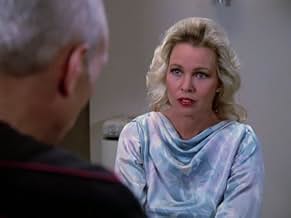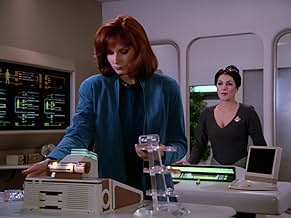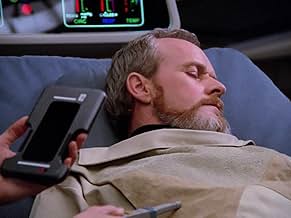We'll Always Have Paris
- Episode aired Apr 30, 1988
- TV-PG
- 45m
IMDb RATING
6.5/10
3.9K
YOUR RATING
A scientist's experiment in time goes awry, reuniting Picard with an old flame, now married to the scientist.A scientist's experiment in time goes awry, reuniting Picard with an old flame, now married to the scientist.A scientist's experiment in time goes awry, reuniting Picard with an old flame, now married to the scientist.
Denise Crosby
- Lieutenant Natasha 'Tasha' Yar
- (credit only)
Wil Wheaton
- Wesley Crusher
- (credit only)
Isabel García Lorca
- Gabrielle
- (as Isabel Lorca)
Majel Barrett
- Enterprise Computer
- (voice)
- (uncredited)
James G. Becker
- Youngblood
- (uncredited)
Featured reviews
Enterprise encounters time distortions and Captain Picard is faced by someone from his past.
This is an interesting episode with a good focus on Picard and a strong sci-fi concept.
The story follows two plot threads of the time ripples and a lady from Picard's past. It feels that both are thematically linked with time and reliving past moments which I thought was a good. Whether or not any of it is compelling is debatable. Personally I found it enjoyable because I'm rather nerdy about space and time, but how the story unfolds is probably not in the most riveting way. Once you get into the emotions of the love interest plot it kind of sucks all the life out of it in the next scene with a lot of technobabble.
Some of it is reminiscent of the original series episode 'The Alternative Factor', but this is far better.
Picard has a number of good scenes that provides a bit of backstory and shows him in a more emotional and sensitive light than other episodes.
Data is pretty cool as he contributes to the story in an important way.
Dr Crusher has some scenes that explicitly state she has feelings for one individual. Personally I would have rather left this unsaid and let it be implied in their behaviour towards each other in later episodes.
Deanna Troi does have the unique ability to kill the momentum in all her scenes. It's not the fault of the actress, it's the way she's written into plots to analyse how everyone feels. This does ruin the flow of several episodes.
The visuals are good, particularly in the more sci-fi heavy scenes and on the holodeck.
Patrick Stewart is excellent in this episode and whilst everyone else is solid, he stands out significantly with this type of material.
This is an interesting episode with a good focus on Picard and a strong sci-fi concept.
The story follows two plot threads of the time ripples and a lady from Picard's past. It feels that both are thematically linked with time and reliving past moments which I thought was a good. Whether or not any of it is compelling is debatable. Personally I found it enjoyable because I'm rather nerdy about space and time, but how the story unfolds is probably not in the most riveting way. Once you get into the emotions of the love interest plot it kind of sucks all the life out of it in the next scene with a lot of technobabble.
Some of it is reminiscent of the original series episode 'The Alternative Factor', but this is far better.
Picard has a number of good scenes that provides a bit of backstory and shows him in a more emotional and sensitive light than other episodes.
Data is pretty cool as he contributes to the story in an important way.
Dr Crusher has some scenes that explicitly state she has feelings for one individual. Personally I would have rather left this unsaid and let it be implied in their behaviour towards each other in later episodes.
Deanna Troi does have the unique ability to kill the momentum in all her scenes. It's not the fault of the actress, it's the way she's written into plots to analyse how everyone feels. This does ruin the flow of several episodes.
The visuals are good, particularly in the more sci-fi heavy scenes and on the holodeck.
Patrick Stewart is excellent in this episode and whilst everyone else is solid, he stands out significantly with this type of material.
I give this ten. 6.6 Average come on! Michelle Phillips California Dreaming. I watched The Next Generation when it first came out. This episode is not bad at all but Michelle Phillips. Oh my...
Writing in 2021, it is great to see that I am not the only person taking a retrospective look at Star Trek, the Next Generation. When this series was first released in 1987, a little less than twenty years after the end of the Original Series, many people thought that, without Captain Kirk and his crew, it couldn't really be Star Trek. However, original creator Gene Roddenberry, was fully invested in the casting, writing and overall look of the new series, so let's see how it shaped up:
This episode was embarrassingly bad at the time and hasn't aged well, either.
Why did the crewmembers, confronted with a potentially universe-ending, race against time, interdimensional phenomenon, spend so much time talking about their feelings?
Why on earth did Michelle Phillips agree to do this piece if she felt so uncomfortable in the role?
Why did Patrick Stuart, who has the skills to romance a cardboard cut-out convincingly should he feel so inclined, turn in a performance so completely devoid of charm?
The screen realisation of the Cafe Des Artistes was about as Gallic as plate of cold French fries and an insult to the Parisians of any century.
Best forgotten.
(Senior Trekker scores every episode with a 5)
This episode was embarrassingly bad at the time and hasn't aged well, either.
Why did the crewmembers, confronted with a potentially universe-ending, race against time, interdimensional phenomenon, spend so much time talking about their feelings?
Why on earth did Michelle Phillips agree to do this piece if she felt so uncomfortable in the role?
Why did Patrick Stuart, who has the skills to romance a cardboard cut-out convincingly should he feel so inclined, turn in a performance so completely devoid of charm?
The screen realisation of the Cafe Des Artistes was about as Gallic as plate of cold French fries and an insult to the Parisians of any century.
Best forgotten.
(Senior Trekker scores every episode with a 5)
This is an excellent episode, addressing unrequited love and the fabric of space. An old friend and super scientist invokes his old friend's good nature to try to repair the results of experimentation in time. Because of this rift, a series of events take place where things become sort of stacked. This also brings in the character of a beautiful woman that Picard loved back in the day. As with Ingrid Bergman in Casablanca, she chose the great man, the man going places, even if she didn't love him. Because things are able to be repeated, Picard is given a second chance. He can let his friend die and get the girl or try to solve the problem. There are some wonderful scenes where events test the quick thinking of the crew as reality and time are chopped up. We get to see the lonely captain, wanting something so bad, an opportunity one never gets. We are also again able to see Beverly's true feelings for Jean-Luc. Of course, some believe that Picard's arbitrariness led to the doctor's husband losing his life. A very good episode with lots of implications.
I must have been between 8 to 10 years old when Star Trek: The Next Generation first aired in my country. It became for me, as for so many others, a pillar in one's growing up and throughout life. I might have rewatched (rather: binged) the whole series about 20 times.
This episode is, in my honest opinion, misunderstood by lots of people, including the writers themselves. Making such a comment is quite bold, not to say filled with hubris, so please allow me to elaborate.
Reading the trivia and comments, there's a lot of focus on the love story, but I believe that this, as far as a story that wants to be told, was only the setting for the main events. The central story was dealing with time, gravity, and the distortions caused by meddling with them. It was dealing with the construction of space, time, and reality.
Similarly to "Where no-one has gone before", where there are several side-stories; Wesley's being ignored and then vindicated, Kosinski's arc from arrogance to humility and being needed, even Picard briefly getting a visit from his past. These stories are there to support the main event, they are there to bring depth, illustrations, metaphors and examples to the main event. The main event is about the fabric of reality, and the teasing notion that space, time and thought are connected.
I like to view this episode in a similar way. The main event is about time, gravity and the construct of reality. And the love story is a supporting arc. Unfortunately, the main event is shadowed somewhat by the side-story, as even the people involved (writers, producers, cast etc) focused more and got distracted by the love story and forgot about the grandeur of the main event. But the central story still stands out and I shall forever be fascinated with the turbolift incident, and of course the climactic ending where Data saves the day.
One of my favourite ST:TNG episodes, almost 40 years down the line.
This episode is, in my honest opinion, misunderstood by lots of people, including the writers themselves. Making such a comment is quite bold, not to say filled with hubris, so please allow me to elaborate.
Reading the trivia and comments, there's a lot of focus on the love story, but I believe that this, as far as a story that wants to be told, was only the setting for the main events. The central story was dealing with time, gravity, and the distortions caused by meddling with them. It was dealing with the construction of space, time, and reality.
Similarly to "Where no-one has gone before", where there are several side-stories; Wesley's being ignored and then vindicated, Kosinski's arc from arrogance to humility and being needed, even Picard briefly getting a visit from his past. These stories are there to support the main event, they are there to bring depth, illustrations, metaphors and examples to the main event. The main event is about the fabric of reality, and the teasing notion that space, time and thought are connected.
I like to view this episode in a similar way. The main event is about time, gravity and the construct of reality. And the love story is a supporting arc. Unfortunately, the main event is shadowed somewhat by the side-story, as even the people involved (writers, producers, cast etc) focused more and got distracted by the love story and forgot about the grandeur of the main event. But the central story still stands out and I shall forever be fascinated with the turbolift incident, and of course the climactic ending where Data saves the day.
One of my favourite ST:TNG episodes, almost 40 years down the line.
Did you know
- TriviaThe menu at the Café des Artistes includes such delicacies as "Croissants D'ilithium", "Klingon Targ a la mode," "Tribbles dans les blankettes," and "L'Antimatter Flambé."
- GoofsWhen Data puts the antimatter in the stream, he asks for a 27 second count down. Data has an internal chronometer and is notorious for giving arrival times down to the second. He is also capable of handling multiple calculations and thoughts at the same time without distraction. Why would he need an external audio countdown? Data requested the external audio countdown before the time distortion occurred because he knew that, when it occurred, there would be more than one of him and then could link his chronometer with the correct dimension.
- Quotes
[last lines]
Commander William T. Riker: I've only been there once, but they've got this great club - I don't remember the name of it. They serve those blue concoctions.
Counselor Deanna Troi: It's across the square from the Zanza Men's Dance Palace.
Captain Jean-Luc Picard: It's called the Blue Parrot Cafe - and you're buying.
- ConnectionsFeatured in Viden om: Teleportation (1999)
- SoundtracksStar Trek: The Next Generation Main Title
Composed by Jerry Goldsmith and Alexander Courage
Details
- Runtime
- 45m
- Color
- Sound mix
- Aspect ratio
- 1.33 : 1
Contribute to this page
Suggest an edit or add missing content


























